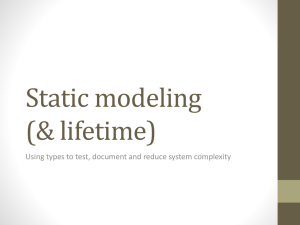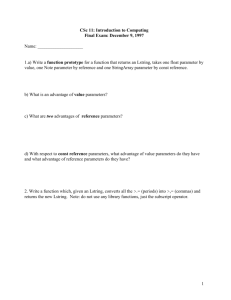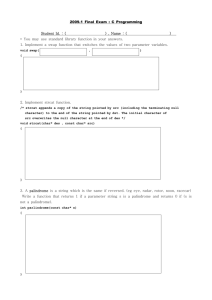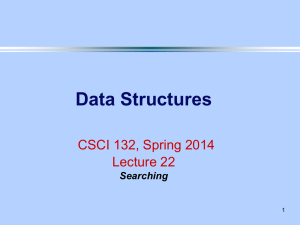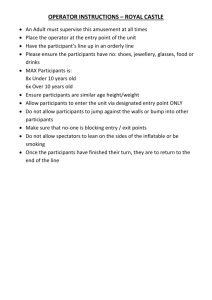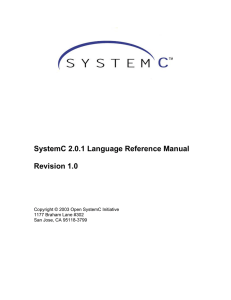11-Overloading1
advertisement
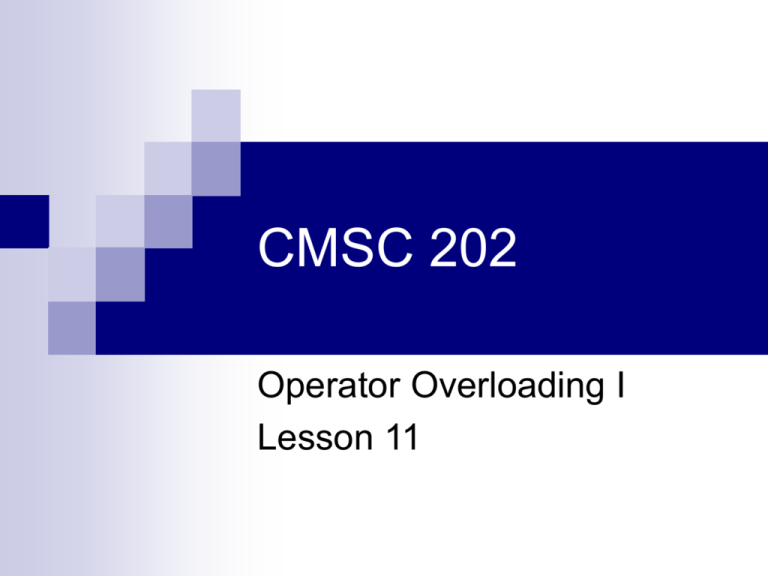
CMSC 202
Operator Overloading I
Lesson 11
Warmup
Write the class declarations
An Employee “has a” Manager
(include >= 1 method and >=1 data member)
// Employee class
____________________
____________________
____________________
____________________
____________________
____________________
____________________
____________________
// Manager class
____________________
____________________
____________________
____________________
____________________
____________________
____________________
____________________
Review
What is aggregation?
Give me an example of aggregation…
What is instantiation?
What would it look like to instantiate an
Employee?
A Manager?
What might it look like to assign a Manager to an
Employee?
Let’s Take a Closer Look…
// In Employee.h
class Employee
{
public:
void SetManager(const Manager& boss);
private:
Manager m_boss;
};
// In Employee.cpp
void Employee::SetManager(const Manager& boss)
{
m_boss = boss;
}
// In main…
Employee me;
Manager boss;
me.SetManager(boss);
Does this work?
If so, how???
Assignment Operator
Compiler creates a default assignment
operator
Copies
data member values
Manager a(“Bob”);
Manager a
---------------Name = “Bob”
Copy
data
Manager b;
b = a;
Manager b
---------------Name
Name
= “Bob”
= “”
Not the same Manager!
Just have same data!
Other Operators?
Does this work with other operators?
Money
Money
Money
c = a
a(2, 50);
b(3, 20);
c;
+ b;
//
//
2.50
3.20
Unfortunately, no…
But…we
can define it ourselves!
Review: Function Overloading
void swap (int& a, int& b);
void swap (double& a, double& b);
void swap (Bob& a, Bob& b);
Same (or similar) functionality for different types…
Function signatures include
Function name
Parameter list (both number and types)
Sidenote
C++ compiler has a built-in function called “swap”
Closer Look at Operators…
We could do…
Money a(2, 50);
Money b(3, 20);
Money c;
c = Add(a, b);
//
//
2.50
3.20
// we write…
Or…we can use
Operator
Overloading and do this:
c = a + b;
// we write…
Operator Overloading
Define a function that overloads an
operator to work for a new type
Example:
Function Name…essentially
const Money operator+ (const Money& a, const Money& b)
{
return Money( a.GetDollars() + b.GetDollars(),
a.GetCents() + b.GetCents());
}
How could this
What’s going
function be
on here?
improved?
Operator Overloading
Can also be overloaded as member functions
First object in statement
a + b
is equivalent to
a.operator+(b)
Example:
becomes the “calling” object
One parameter!
const Money Money::operator+ (const Money& b) const
{
return Money( m_dollars + b.m_dollars,
m_cents + b.m_cents);
Why const?
}
Notice:
implicit object!
Return by const value?
const Money operator+ (const Money& a, const Money& b);
const Money operator+ (const Money& b) const;
Why return by const value?
Imagine
this
Money a( 4, 50 );
Money b( 3, 25 );
Money c( 2, 10 );
(a + b) = c;
Evaluates to an
unnamed object if we
don’t return by const!
Why is this an issue?
Think about:
Money d;
d = (a + b) = c;
What is this supposed to
mean? (d gets c’s value)
Return by const value
prevents us from altering
the returned value…
Why not return by const-ref?
const Money operator+ (const Money& a, const Money& b)
{
return Money( a.GetDollars() + b.GetDollars(),
a.GetCents() + b.GetCents());
}
Look closely…
We
return a copy of a temporary Money
object…
It goes out of scope when the function
returns!
Operator Overloading
What about the following:
Money a( 3, 25 );
Money d = a + 10;
class Money
{
public:
Money( int dollars, int cents );
Money( int dollars );
What does the compiler do?
Looks for a constructor for Money
that takes 1 int parameter
Uses that constructor to build a
new Money object
Calls the ‘+’ operator
function/method
What about the following:
Money a( 3, 25 );
Money d = 10 + a;
// more methods
private:
int m_dollars;
int m_cents;
};
Tries to find an
int constructor that
accepts a Money
parameter…uh oh!
Other Operators?
You can overload just about anything, but you should be VERY
careful…
[]
* multiplication, pointer dereference
/ division
+ addition, unary positive
- substraction, unary negative
++ increment, pre and post
-- decrement, pre and post
= assignment
<=, >=, <, >, ==, != comparisons
…
Many, many others…
Practice
Let’s overload the
multiplication on
money…
Ignore “roll-over”
Member function?
Non-member function?
// In Money.h
class Money
{
public:
Money( int dollars, int cents );
int GetDollars();
int GetCents();
void SetDollars( int dollars );
void SetCents( int cents );
private:
int m_dollars;
int m_cents;
};
// In main…
Money m( 100, 00 );
m = m * 10;
Challenge
Fix the multiplication operator so that it
correctly accounts for rollover.
